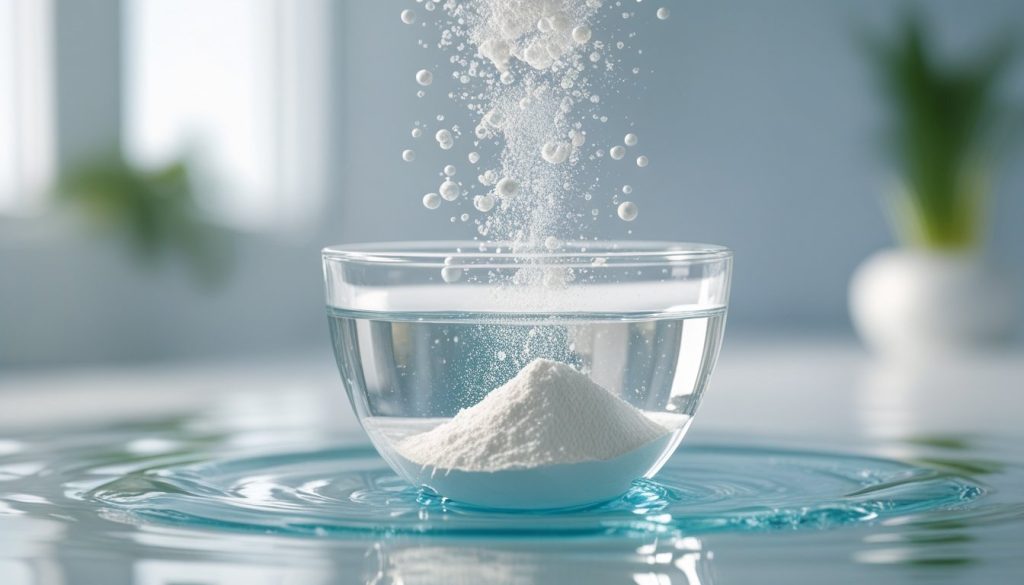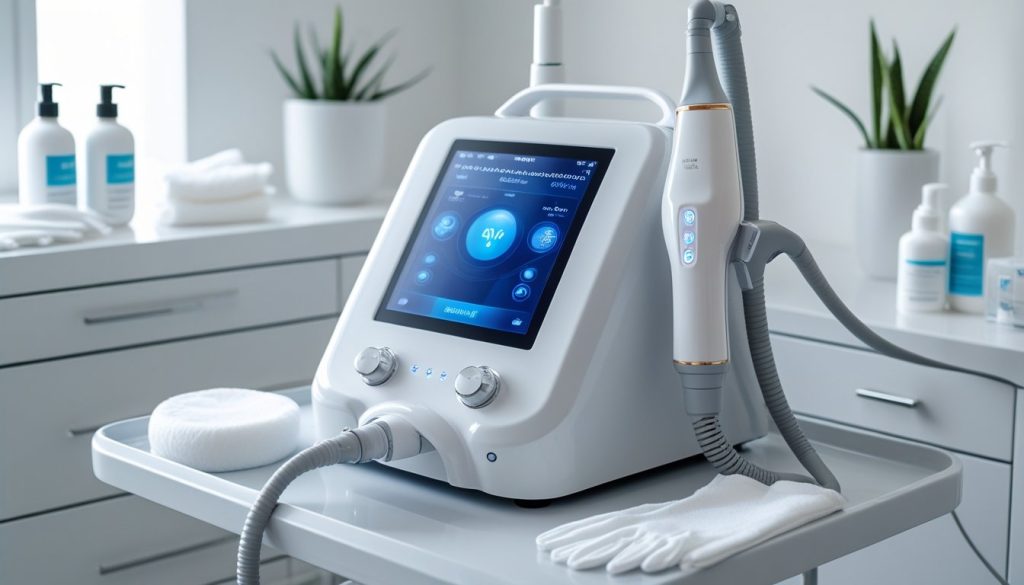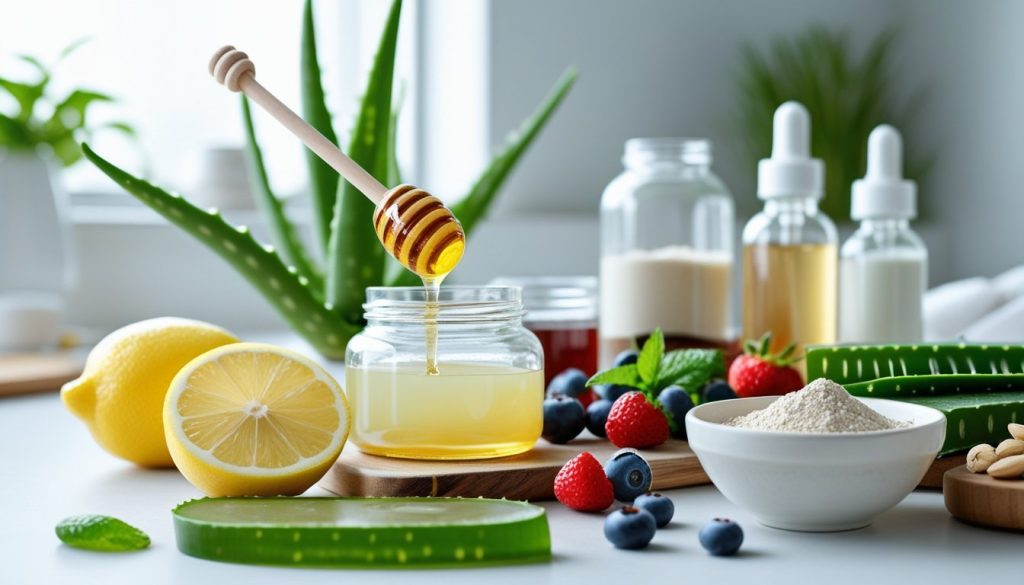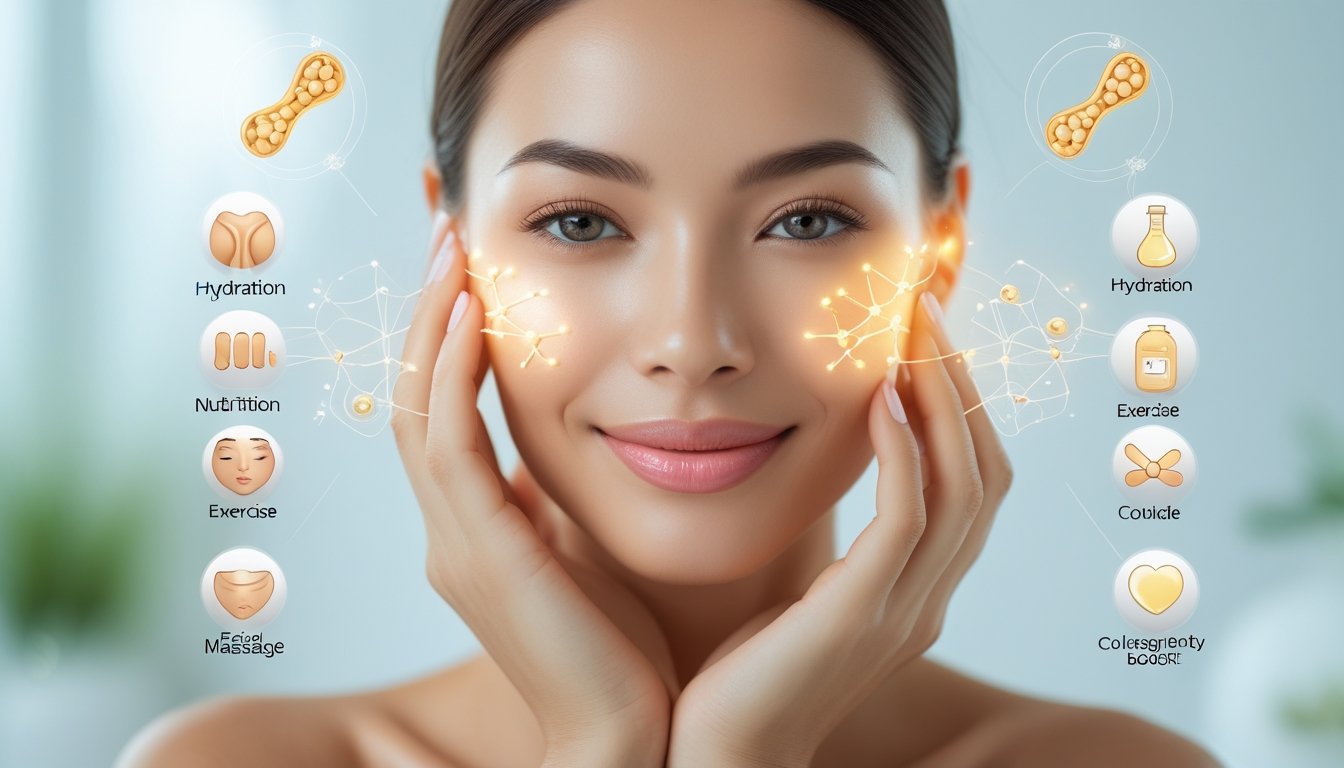Skin Elasticity Boost: Achieving firm, elastic skin doesn't have to remain an elusive dream. With the proper skin elasticity boost techniques and proven collagen tricks for firmness, you can restore your skin's youthful bounce and vitality. Understanding how collagen works and implementing strategic approaches can dramatically transform your skin's appearance and texture.
Collagen serves as the primary structural protein in human skin, providing the foundation for elasticity, firmness, and overall skin integrity1. As we age, natural collagen production declines significantly, resulting in visible signs of aging, including wrinkles, sagging, and loss of skin elasticity. However, scientific research demonstrates that specific interventions can effectively stimulate collagen synthesis and restore skin firmness.
Understanding Collagen's Role in Skin Elasticity
Collagen forms the backbone of healthy skin structure, comprising approximately 75% of skin's dry weight. This essential protein creates a supportive matrix that maintains skin thickness, elasticity, and hydration levels. As collagen production decreases with age, the skin undergoes structural and functional changes, including reduced synthesis and increased breakdown of existing collagen fibers.
The aging process typically begins affecting collagen production in our mid-twenties, with a decline of approximately 1% per year. This gradual reduction becomes more pronounced after menopause in women, when hormonal changes accelerate the loss of collagen. Environmental factors such as UV exposure, pollution, and lifestyle choices further compromise collagen integrity, making targeted interventions crucial for maintaining skin elasticity.
Research indicates that promoting collagen synthesis represents one of the most effective strategies for combating skin aging and restoring firmness6. By understanding the mechanisms behind collagen production and implementing evidence-based approaches, individuals can significantly improve their skin's elasticity and overall appearance.
Trick 1: Marine Collagen Supplementation for Maximum Absorption
Marine collagen supplementation is one of the most effective methods for boosting skin elasticity. Derived from fish scales and skin, marine collagen offers superior bioavailability compared to other collagen sources, allowing your body to absorb and utilize it more efficiently.
Clinical studies demonstrate remarkable results from marine collagen supplementation. In the largest double-masked, placebo-controlled trial ever conducted on hydrolyzed collagen supplements, participants taking 8,000 mg of marine collagen daily experienced a 100% improvement in skin evenness, including a reduced appearance of lines and wrinkles.³ Another study showed that 7,000mg of high-grade marine collagen from freshwater fish delivered increased collagen density, skin hydration, and elasticity after 90 days3.
Optimal dosing and timing play crucial roles in maximizing the benefits of marine collagen. Research suggests taking 2.5-8 grams daily, preferably on an empty stomach, to enhance absorption. Many practitioners recommend adding marine collagen powder to morning coffee or smoothies, as the liquid format facilitates better dissolution and uptake.
The molecular structure of marine collagen peptides makes them particularly effective for skin applications. These smaller peptide chains can more easily penetrate the digestive system and reach skin tissues through the bloodstream, where they stimulate fibroblast activity and promote the synthesis of new collagen.

Trick 2: Microneedling – The Collagen Induction Powerhouse
Microneedling, also known as collagen induction therapy, ranks among the most effective professional treatments for stimulating natural collagen production. This minimally invasive procedure utilizes tiny needles to create controlled micro-injuries in the skin, triggering the body's natural healing response and significantly increasing collagen and elastin synthesis.
The treatment process involves using a device with multiple fine needles that puncture the skin at controlled depths. This controlled injury stimulates fibroblast activity, leading to increased collagen production, improved skin texture, and enhanced firmness. Results include a reduction in scars, pore size, stretch marks, and an overall improvement in skin elasticity.
Treatment frequency and protocol have a significant impact on results. Optimal outcomes typically require monthly treatments for 4-6 months, followed by maintenance sessions every 2-3 months. Each session takes approximately 20 minutes, and with the use of physician-prescribed numbing cream, the procedure remains virtually painless.
Combining microneedling with platelet-rich plasma (PRP) amplifies results by providing additional growth factors that accelerate healing and collagen synthesis. This combination approach represents one of the most powerful methods for achieving significant improvements in skin firmness and elasticity.
Trick 3: Strategic Nutrition for Collagen Synthesis
Nutritional support forms the foundation of effective collagen production. Specific nutrients serve as building blocks and cofactors for collagen synthesis, making dietary choices crucial for maintaining skin elasticity and firmness.
Vitamin C is the most critical nutrient for collagen production, acting as an essential cofactor for enzymes that stabilize and cross-link collagen molecules. 17 Without adequate vitamin C, the body cannot produce strong, resilient collagen fibers. Excellent sources include citrus fruits, bell peppers, strawberries, broccoli, and kiwi fruit.
Protein-rich foods provide the amino acids necessary for the synthesis of collagen. High-quality sources include lean meats, fish, eggs, and legumes. Fish rich in omega-3 fatty acids, such as salmon and tuna, offer additional benefits by protecting cell membranes and reducing inflammation that can compromise collagen integrity16.
Antioxidant-rich foods protect existing collagen from damage while supporting the synthesis of new collagen. Dark, leafy greens, berries, tomatoes, and colorful vegetables provide essential antioxidants that neutralize free radicals and help preserve collagen structure.
Hydration plays a crucial role in maintaining skin elasticity. Adequate water intake ensures optimal cellular function and supports the transport of nutrients necessary for collagen production17.

Trick 4: Advanced Topical Treatments and Retinoids
Topical treatments offer targeted approaches for stimulating collagen production directly at the skin level. Retinoids, derived from vitamin A, represent the gold standard for topical collagen enhancement, with extensive research supporting their effectiveness in reducing fine lines and improving skin elasticity1517.
Prescription retinoids such as tretinoin demonstrate superior results compared to over-the-counter retinol products. These compounds work by stimulating fibroblasts, the cells responsible for collagen production, while promoting cellular turnover and renewal. 17 Regular use leads to measurable improvements in skin texture, firmness, and elasticity.
Hyaluronic acid serums complement retinoid treatments by providing intense hydration and supporting collagen synthesis. This naturally occurring substance can hold up to 1,000 times its weight in water, creating optimal conditions for collagen production while improving skin plumpness and elasticity18.
Medical-grade topical products containing stabilized vitamin C provide additional support for collagen. Products like SkinCeuticals H.A. Intensifier and SkinMedica HA5 Rejuvenating Hydrator have demonstrated clinical efficacy in increasing collagen levels and improving skin hydration2.
Application timing and layering techniques maximize the effectiveness of topical treatments. Retinoids work best when applied at night, while vitamin C serums provide optimal benefits during morning routines when combined with broad-spectrum sunscreen protection.
Trick 5: Professional Radiofrequency and Energy-Based Treatments
Radiofrequency treatments represent cutting-edge technology for non-invasive stimulation of collagen. These advanced procedures use controlled energy to heat deeper skin layers, triggering natural collagen remodeling and tightening effects without damaging the surface.
The EndyMed Radio Frequency 3DEEP system exemplifies this technology, delivering energy to multiple skin layers simultaneously to stimulate natural collagen production. Treatment applications include skin tightening, wrinkle reduction, body contouring, and fractional skin resurfacing2.
IntenseRF Microneedling combines radiofrequency energy with microneedling for enhanced results. This dual-action approach creates controlled micro-injuries while delivering thermal energy to deeper tissues, maximizing collagen stimulation across multiple skin layers. The treatment suits all skin types and provides significant improvements in firmness and elasticity2.
Treatment protocols typically involve a series of sessions spaced 4-6 weeks apart, with maintenance treatments recommended every 6-12 months. Results continue improving for several months following treatment as new collagen formation progresses.

Trick 6: Natural DIY Methods and Lifestyle Optimization
Natural approaches complement professional treatments, offering accessible options for daily collagen support. Several evidence-based home remedies can effectively enhance skin elasticity when used consistently.
Facial massage techniques stimulate blood circulation and activate collagen production through mechanical stimulation. Daily massage for 5-10 minutes can improve skin tone and firmness by exercising facial muscles and promoting nutrient delivery to skin cells.
Natural ingredients offer powerful collagen-supporting properties. Aloe vera offers hydrating and firming benefits due to its rich vitamin and antioxidant content. Egg whites create a temporary tightening effect due to their protein content, while honey acts as a natural humectant, attracting moisture to maintain skin plumpness.
Sleep optimization plays a crucial role in collagen maintenance. During deep sleep, the body repairs and regenerates collagen fibers. Aim for 7-8 hours of quality sleep each night to support optimal collagen renewal processes.
Sun protection remains fundamental for preserving existing collagen. UV radiation breaks down collagen fibers, accelerating the aging process. Daily application of a broad-spectrum SPF 30 or higher sunscreen helps prevent collagen degradation and maintain skin elasticity.
Stress management techniques support collagen production by reducing cortisol levels, which can interfere with collagen synthesis. Regular exercise, meditation, and adequate hydration contribute to overall skin health and collagen maintenance.

Clinical Evidence and Research Findings
Extensive scientific research supports the effectiveness of these collagen-boosting approaches. A comprehensive systematic review and meta-analysis of 26 randomized controlled trials involving 1,721 patients demonstrated that hydrolyzed collagen supplementation significantly improved skin hydration and elasticity compared to placebo groups8.
Multiple studies show measurable improvements in skin parameters within 4-12 weeks of consistent intervention. Research indicates that participants experienced 15.69% improvement in skin hydration, 28% reduction in wrinkle depth, and significant enhancement in skin elasticity when following comprehensive collagen support protocols105.
Long-term studies reveal sustained benefits from consistent collagen support. Participants in clinical trials maintained improved skin elasticity, reduced wrinkle visibility, and enhanced overall skin quality for months following treatment completion13.
Safety Considerations and Best Practices
Safety protocols ensure optimal results while minimizing potential risks. Professional treatments should only be performed by qualified practitioners using FDA-approved devices and sterile techniques. Proper consultation and skin assessment help determine the most appropriate treatment approach for individual needs.
Supplement quality varies significantly among manufacturers. Choose third-party tested products from reputable companies that provide certificates of analysis. Marine collagen supplements generally demonstrate excellent safety profiles with minimal reported side effects14.
Topical treatments require gradual introduction to prevent irritation. Start with lower concentrations and increase frequency slowly as skin tolerance develops. Always perform patch tests before trying new products or ingredients.
Maximizing Results Through Combination Approaches
Synergistic effects occur when combining multiple collagen-boosting strategies. The most effective protocols integrate professional treatments with high-quality supplementation, targeted nutrition, and consistent home care routines.
Treatment timing optimization enhances results. Schedule professional treatments during periods when you can maintain consistent home care routines. Allow adequate healing time between intensive procedures while maintaining supportive supplementation and topical care.
Consistency remains the key factor in achieving and maintaining results. Establish realistic routines that you can sustain long-term rather than attempting intensive short-term approaches that prove difficult to maintain.
Ready to take your skin health to the next level? Discover how specific amino acids work synergistically with collagen to enhance your results even further. Explore our comprehensive guide to amino acids and their role in skin health to unlock additional strategies for achieving your best skin ever.
Frequently Asked Questions
How long does it take to see results from collagen supplementation?
Most people notice initial improvements in skin hydration within 4-6 weeks of consistent supplementation. Significant changes in elasticity and firmness typically become apparent after 8-12 weeks of regular use.
Can I combine multiple collagen-boosting methods safely?
Yes, combining approaches often enhances results. However, introduce new treatments gradually and consult with skincare professionals when adding intensive procedures to your routine.
What's the difference between marine and bovine collagen for skin benefits?
Marine collagen offers superior bioavailability and absorption rates, making it more effective for skin applications. It also contains primarily Type I collagen, which is most abundant in skin tissue.
Are there any side effects from collagen supplements?
Collagen supplements generally demonstrate excellent safety profiles. Some people may experience mild digestive upset initially, which typically resolves with continued use or dose adjustment.
How often should I get professional collagen treatments?
Treatment frequency depends on the specific procedure and individual needs. Microneedling typically requires monthly sessions for 4-6 months, while radiofrequency treatments may be spaced 4-6 weeks apart.
Can natural methods alone provide significant results?
Natural methods can provide noticeable improvements, especially when combined consistently. However, professional treatments typically deliver more dramatic and faster results for significant elasticity concerns.
What age should I start focusing on collagen support?
Prevention is most effective, so starting collagen support in your mid-twenties can help maintain skin elasticity. However, it's never too late to begin, and people of all ages can benefit from collagen-boosting strategies.
Do topical collagen products actually work?
While topical collagen molecules are too large to penetrate deeply into skin, they can provide surface hydration. Products containing collagen peptides or ingredients that stimulate collagen production tend to be more effective.
How important is diet for collagen production?
Diet plays a crucial role in providing the building blocks and cofactors necessary for collagen synthesis. Adequate protein, vitamin C, and antioxidants are essential for optimal collagen production.
Can stress affect collagen production?
Yes, chronic stress elevates cortisol levels, which can interfere with collagen synthesis and accelerate collagen breakdown. Stress management techniques support overall skin health and collagen maintenance.

